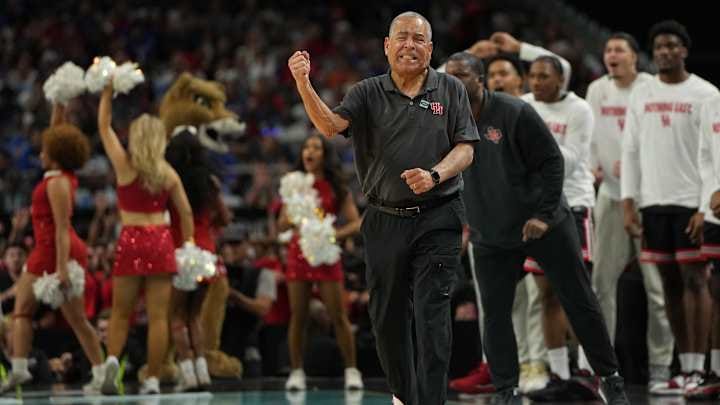Houston's culture won
Kelvin Sampson's crowning achievement was built on more than basketball
SAN ANTONIO — There was an obvious moment to quit. More than one, actually.
With 8:17 left in the second half of Saturday’s second national semifinal, Duke guard Tyrese Proctor hit a free throw. Duke lead 59-45. Houston had been shut out of the game for the previous 31 minutes and 43 seconds, stymied by brilliant Blue Devil defense, so many tortured trips of too many dribbles and too little movement. Duke was doing what Duke had done to almost every team Duke had played for the last four months, overwhelming with length and talent and quality. Facing this situation, Duke’s opponents have almost always read the room, seen what’s coming, lost their nerve, and folded. They’ve taken the loss and kept it pushing.
Imagine how easy it would be. Imagine how simple. Imagine the relief. Imagine your home workout, when you can’t push through the last five seconds of a 30-second Peloton sprint, when you dog it because you’ve hit your own imaginary wall.
Houston won’t accept this. Houston is incapable of accepting this. Houston didn’t accept this. Nor, again, with 3:03 left to play, when Maliq Brown whipped a bullet crosscourt kickout to Cooper Flagg, who predictably buried an open corner 3. 64-55. Dagger. That make quelled the halting run the Cougars had cobbled together in the previous five minutes. It felt like the end.
There were other moments, too, including when Duke led 66-59 with 1:26 to play. Or at 1:14, when Joseph Tugler committed an unthinkable technical foul touching the ball before Duke inbounded it, and practically cried on the court over his guilt. Or with 35 seconds left, when Duke led by six.
Everyone in the world saw these moments that way: everyone at the throbbing Alamodome, every Florida and Auburn fan watching at bars and restaurants in downtown San Antonio, everyone at home. Duke, as ever, too good. Nice season, Coogs. Now go home.
“At some point, if you have a culture, quitting is not part of the deal,” Kelvin Sampson said, a few minutes after Houston’s brain-melting 70-67 comeback win. “We're not going to quit. We're just going to play better.”
Talking about culture seems too obvious. It feels cliché, passé, fuzzy, the kind of thing sportswriters used to overindex at the expense of more definable technicalities. Every coach in the world talks about core principles and collective devotion and playing the right way. Every program has culture. These days, it is more advisable to focus on the definable specifics of big games: screen coverages, set actions, rebounding rates, shot quality.
But to do any of that stuff at a high level, at the level Houston does it, with the talent Houston has, you have to live by a non-negotiable code. No program in the country lives it like Sampson’s.
“If you lose the game, and you didn't quit, you didn't really lose,” Houston forward J’Wan Roberts said. “Once you don’t quit, if you believe, anything can happen.”
Keep reading with a 7-day free trial
Subscribe to Buzzer by Eamonn Brennan to keep reading this post and get 7 days of free access to the full post archives.


